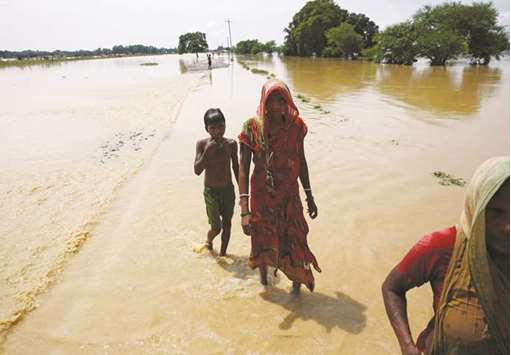Elephants were pressed into service to rescue hundreds of foreign tourists trapped in a Nepal jungle safari park, officials said yesterday, as the death toll from flash floods and landslides after four days of heavy rains rose to 70.
In Sauraha, 80km south of Kathmandu, the Rapti River overflowed its banks, inundating hotels and restaurants and stranding some 600 tourists. Sauraha, on the fringe of Chitwan National Park, is home to 605 greater one-horned rhinoceroses, or Indian rhinoceroses, and is popular with foreign tourists, including Indian and Chinese visitors, mainly for elephant ride and rhino-watching.
“Some 300 guests were rescued on elephant backs and tractor trailers to (nearby) Bharatpur and the rest will be taken to safer places soon,” Suman Ghimire, chief of a group of Sauraha hotel owners, said by telephone yesterday. Shiva Raj Bhatta of WWF Nepal said one rhino had died in the floods.
Relief workers said 26 of Nepal’s 75 districts were either submerged or hit by landslides after heavy rains lashed the mainly mountainous nation, home to Mount Everest and the birthplace of Lord Buddha.
The death toll, which had stood at 49 on Sunday, was expected to rise with another 50 people reported missing in the floods and landslides, Information and Communications Minister Mohan Bahadur Basnet said.
Basnet said more than 60,000 homes were under water, mainly in the southern plains bordering India.
Estimates of losses were not available, with rescuers yet to reach villages marooned by the worst floods in recent years.
“The situation is worrying as tens of thousands of people have been hit,” Basnet told Reuters.
Large swaths of farmland in the southern plains, Nepal’s breadbasket, are under water and the Himalayan country could face food shortages due to crop losses, aid workers said.
“The heavy rains hit at one of the worst times, shortly after farmers planted their rice crop in the country’s most important agricultural region,” said Sumnima Shrestha, a spokeswoman for US-based non-profit group Heifer International.
Monsoon rains, which start in June and continue through September, are important for farm-dependent Nepal, but they also cause heavy loss of life and property damage each year.
In all at least 175 people have died across Nepal, India and Bangladesh, officials said, warning the toll could rise as the extent of the damage becomes clear.
Three days of relentless downpours sparked flash floods and landslides that have killed at 22 in Bangladesh.
The Nepal Red Cross warned that shortages of safe drinking water and food could create a humanitarian crisis in the impoverished Himalayan country.
“In many parts of the country there is a scarcity of safe drinking water creating a high risk of health hazards,” spokesman Dibya Raj Poudel told AFP.
“Several villages and settlements are unreachable. Telecommunications, mobile phones are still not working so it is difficult to give a full assessment.”
A local volunteer in Saptari district — one of the worst affected areas — said the water level was receding but many people were still stranded on higher ground.
“Water level has decreased a little bit but families still cannot return home. They are taking shelter in sheds.
What people need now is clean drinking water and food,” volunteer Dipak Kumar Yadav told AFP.
On the outskirts of Janakpur, in southeastern Nepal, local residents were sheltering in a local temple after the flood waters had totally destroyed their basic mud homes, though the water had mostly receded.
Bangladesh deployed troops to shore up embankments in the north of the country, where flooding has killed 22 people.
Local government administrator Kazi Hasan Ahmed told AFP up to 700,000 people had been marooned by flood waters after rivers burst their banks following days of heavy rain.
“We’ve not seen such severe floods in Dinajpur since 1988,” he said, referring to the worst-hit district.
“The town protection embankment was washed away by flood water, submerging most of the main town.”
The government’s Flood Forecasting and Warning Centre warned that water levels in some major rivers would continue to rise over the next 72 hours, raising fears the flooding could spread.

Flood victims in Saptari District, Nepal.
